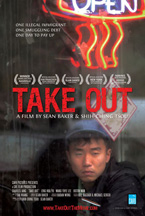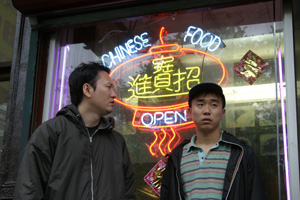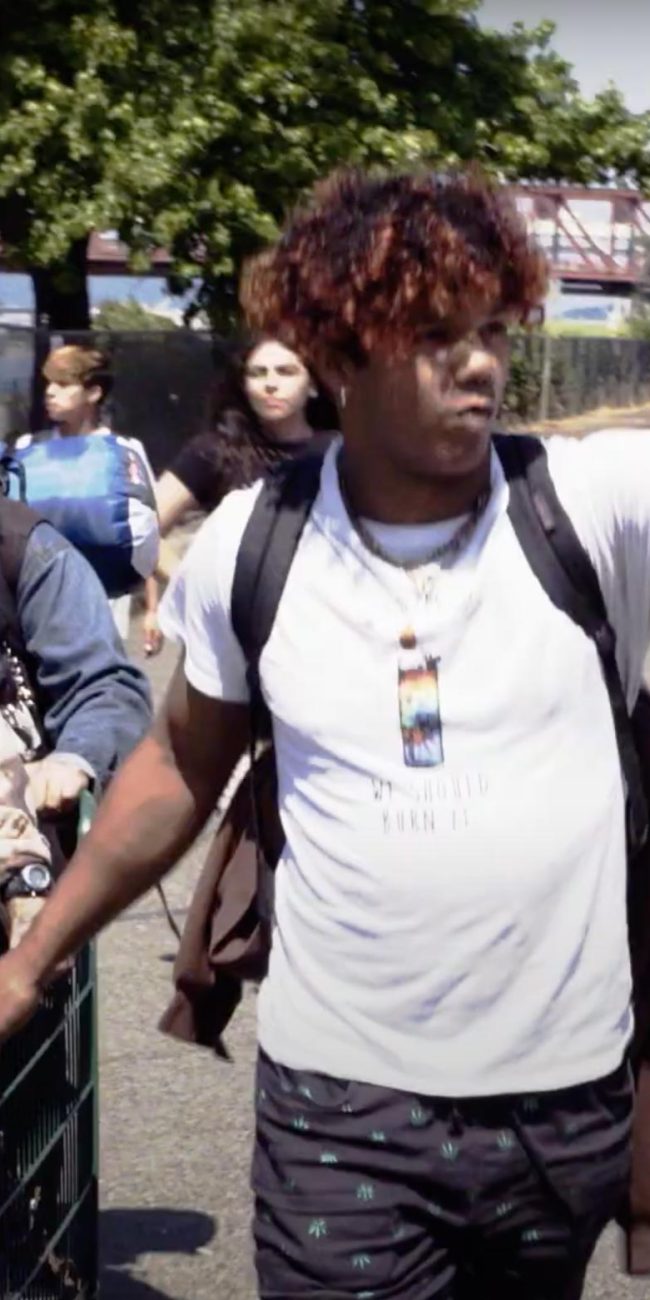
(Take Out is now available on DVD through Kino. Visit the film’s official website to watch the trailer and learn more. Buy it at Amazon.)
To call Sean Baker and Shih-Ching Tsou’s Take Out ‘documentary-like’ is to undersell its massive accomplishment as a narrative feature so startlingly realistic that it feels more like a documentary than most documentaries. There actually needs to be a new word to define their achievement, for while its technical attributes are more closely aligned with films in the dreaded M-word genre, and while it shares a thematic kinship with other recent dramas about various immigrant experiences in New York City (Man Push Cart, Sangre De Mi Sangre, Maria Full of Grace), Take Out transcends its modern limitations in order to carry itself with the weight of an Italian Neo-Realistic classic. Many films are lazily compared to The Bicycle Thief, but Take Out warrants that lofty comparison. Baker and Tsou’s dramatic day-in-the-life portrait of a Chinese immigrant uses meager digital video aesthetics and a limited budget to capture the loud, hurried, ambivalent buzz of modern New York City; in doing so, they have created something genuinely profound and poetic.
The story is simple. A recent Chinese immigrant, Ming Ding (Charles Jang), who borrowed money from a loan shark to pay his family back for funding his illegal entry into America, has one workday to make his next payment. The problem is that he’s a Chinese food deliveryman, one of the more thankless and lesser paying jobs in New York City. But he dives into the task anyway, pedaling his bicycle through wind and rain to earn enough tips to keep the loan shark’s henchmen away.
The above synopsis could be turned into about a thousand different films, but Baker and Tsou have chosen the noblest one of all. By simplifying the situation and establishing a real-time pace, without a foreboding score or other cinematic tricks, they create a subconscious tension that becomes even more honest and dramatic as the film unfolds. In one sense, it’s anti-tension. Every seemingly insignificant order that we see being placed in the restaurant itself, every stairwell that Ming Ding climbs, every single shot of Ming Ding trudging through the rain, is not mere redundancy or filler on the filmmakers’ part. These are all carefully constructed reminders that for illegal immigrants in New York City, every single second is an epic struggle that truly matters. When we do see the monetary exchanges, between Ming Ding and a brilliantly eclectic mix of New York City residents, we are reminded further of just how impossible his task actually is, for the tipping is meager at best.
 Whereas many ultra-low-budget filmmakers have embraced the newfound glories of cheaper video technology to make movies that accurately represent the safe cocoons in which they frolic, Baker and Tsou decided to leave their own lives behind in order to address the more universally complex issue of illegal immigration. But what makes Take Out so fulfilling—and in keeping with Italian Neo-Realism—is that it is, first and foremost, a simple and direct story about a simple man with a basic task. With exceptional skill, Baker and Tsou have turned their specific, personal portrait into a broader, deeper metaphor for illegal immigrants of every nationality, who risked their lives to travel to this land of opportunity in order to provide for their loved ones back home, but here they are, making very little and feeling lost, scared, and alone.
Whereas many ultra-low-budget filmmakers have embraced the newfound glories of cheaper video technology to make movies that accurately represent the safe cocoons in which they frolic, Baker and Tsou decided to leave their own lives behind in order to address the more universally complex issue of illegal immigration. But what makes Take Out so fulfilling—and in keeping with Italian Neo-Realism—is that it is, first and foremost, a simple and direct story about a simple man with a basic task. With exceptional skill, Baker and Tsou have turned their specific, personal portrait into a broader, deeper metaphor for illegal immigrants of every nationality, who risked their lives to travel to this land of opportunity in order to provide for their loved ones back home, but here they are, making very little and feeling lost, scared, and alone.
What ultimately distinguishes Take Out is that it is a rare narrative feature that works better on video than it would have on film (for a celluloid-phile, this is a remarkable achievement). Baker and Tsou are clearly aware of the format they had to work with, and rather than try to aim higher, they respected the medium and used it to their advantage. The level of filmmaking intelligence at work here separates Baker and Tsou from so many other ultra-low-budget directors attempting to create social-realist cinema. A perfect example of this is when Ming Ding stops to zip up his jacket as the rain begins to pour. As he tries to connect the zipper, the camera shakily zooms out and his bicycle falls to the ground. This is not simply an impromptu shot captured on digital video, it has a deeper, sadder, more lasting impact. Even the film’s lighter, more humorous moments reflect this elevated state.
Not only is Take Out a poignant commentary on the life of an immigrant in New York City, it is one of the more honest and accurate depictions of New York City that the screen has ever seen. By choosing to follow one of these unknown, unrecognized, thankless residents, Baker and Tsou capture the impossibly wide range of nationalities, races, languages, and personalities that make New York City so distinct, so ugly, so beautiful, so loud, so isolating, so confrontational, so comforting, so disheartening, so inspiring, so all of that and so much more.
— Michael Tully












Pingback: Hammer to Nail » Blog Archive » A Conversation With Sean Baker
Pingback: A Conversation With Sean Baker and Dree Hemingway (STARLET) – Hammer to Nail
Pingback: HOME VIDEO PICKS – Hammer to Nail
Pingback: DRIVERS WANTED – Hammer to Nail